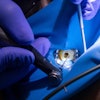
A specific type of bacteria commonly found in the mouth can migrate to the gut and grow within human colorectal cancer (CRC) tumors, potentially exacerbating cancer progression, according to a study recently published in Nature.
Fusobacterium nucleatum (Fn), a bacterium linked to periodontitis and oral carcinomas but which is not typically found in the lower gut of healthy people, was not only abundant in CRC tumors, but a subset of this germ may be responsible for advancing these tumors, the authors wrote.
"This clade is highly virulent in the context of CRC, and should be a primary focus in subsequent mechanistic studies on Fn pathogenicity in CRC and for the development of targeted inhibitors," wrote the authors, led by Susan Bullman, PhD, of the Fred Hutchinson Cancer Center (Nature, March 20, 2024, Vol. 628, pp.424-432).
To investigate oral cavity bacteria, colorectal tumors from more than 200 patients were analyzed for F. nucleatum. Researchers examined the genetic factors of F. nucleatum bacteria related to tumor colonization in CRC. They analyzed 135 strains, including those from oral samples of individuals without cancer and strains isolated from CRC tumors, according to the study.
They found 483 genetic factors enriched in CRC strains, with a focus on a subspecies of F. nucleatum, Fna. Interestingly, they discovered that Fna is composed of two distinct clades, with Fna C2 being predominant in CRC tumors. Further analysis revealed 195 genetic factors associated with Fna C2, indicating its enhanced ability for metabolism and colonization in the gastrointestinal tract, the authors wrote.
A subtype of F. nucleatum showed up in nearly 50% of tumors that were examined. Furthermore, this subtype was found in about 30% of the stool samples from patients with colorectal cancer, they wrote.
"Fna C2 is a highly virulent subgroup of Fn that should be the primary focus for mechanistic studies and therapeutic drug design in CRC," Bullman et al concluded.




















